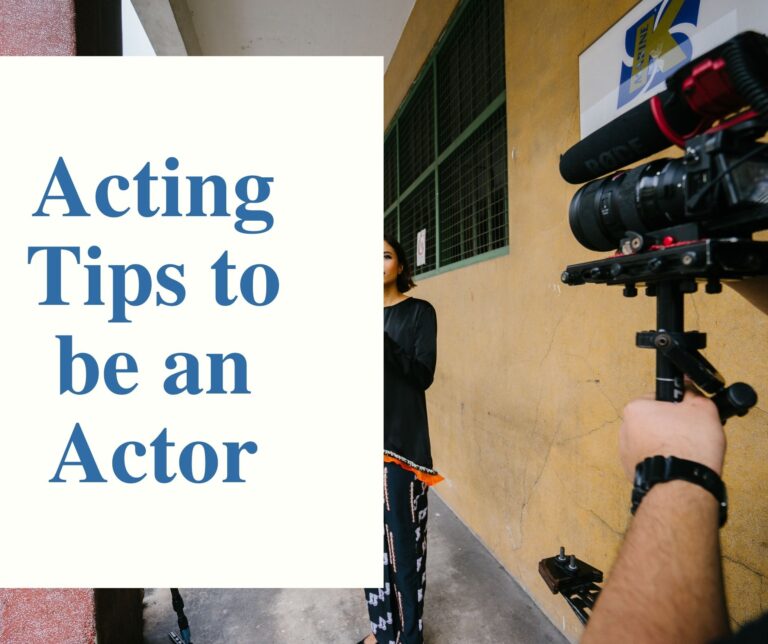How to Get Better at Acting and Conquer Every Stage
If you are searching How to Get Better at Acting? Here is the comprehensive guide to becoming a better actor. Do auditions, develop your skills, read blogs, expand your acting network, and get feedback. Let’s have a look:
Do you have a passion for acting? Are you drawn to the power of storytelling and the ability to transport others through performance? Whether you’re a seasoned stage veteran or just starting your acting journey, the desire to improve your craft is an ever-present flame. You can cultivate your acting skills and reach new heights with the right approach and dedication. This is your guide, your map to unlocking your inner star and becoming the actor you were always meant to be. Let’s try how to get better at acting and conquer every stage.
This is not just a guide to “getting better” at acting. This is a call to unleash the unchecked potential that lies dormant within you. This is a call to embrace the power of transformation, shed your inhibitions, and become a conduit for the human experience in all its complexity. Prepare to explore the depths of character exploration, sharpen your emotional arsenal, and master the tools of your craft.
This journey will not be easy, but it will be transformative. It will demand dedication, discipline, and a willingness to face your fears and push your boundaries. But in the end, it will be a journey of immense self-discovery, a journey that will make you not only a better actor but also a better human being. Let’s dig into the blog to get answers about How to Get Better at Acting:
Table of Contents
How to get better at acting?
So, are you ready to begin on this quest? Are you prepared to embrace the challenge and unlock the actor within? Then step forward, fearless adventurer, and let the curtain rise on the most extraordinary performance of your life.
Step 1: Unlock Your Potential
This is the first step in how to get better at acting. The foundation of captivating acting lies not simply in memorizing lines and delivering them flawlessly but in understanding and expressing the essence of your character. This requires a deep dive into the depths of nature, a journey of exploration that unlocks your potential as an actor and allows you to breathe life into your performance. Let’s consider some essentials here!
1. Understanding the Motivations
No matter how small their role, every character is driven by desires, fears, and past experiences that shape their actions and emotions. Unmasking these motivations is the key to unlocking their true essence. Ask yourself:
- What does this character want? What drives them forward?
- What are their fears and vulnerabilities? What do they strive to avoid?
- How has their past shaped their present? What experiences have influenced their personality and worldview?
By exploring these questions, you gain a deeper understanding of what motivates your character, allowing you to make conscious choices that align with your inner world.
2. Embracing the Physicality
A character’s physicality is more than just their appearance; it’s their way of moving, speaking, and interacting with the world around them. Embracing this physicality allows you to embody the character fully and communicate their emotions through nonverbal cues.
- Consider how your character stands, walks, and interacts with objects. Does their posture convey confidence or timidity? Do they speak in a slow, measured tone or with rapid-fire energy?
- Explore their mannerisms and habits. Do they have a nervous tick or a specific way of expressing their emotions through facial expressions?
- Experiment with different vocal qualities. How would their age, social status, and background influence their way of speaking?
By meticulously crafting your character’s physicality, you create a deeper connection to them and allow their inner world to shine through in your performance.
3. Connecting with the Emotional Landscape
Emotions are the very lifeblood of acting. They capture the intricate tapestry of emotions that your character experiences, bring them to life, and connect with the audience profoundly.
- Analyze the emotional arc of your character. What emotional highs and lows do they experience throughout the story? What triggers these emotions?
- Identify the specific emotions your character feels in each scene. Are they angry, frustrated, joyful, or heartbroken?
- Practice expressing these emotions authentically through your performance. Explore different techniques for creating genuine emotional responses, such as sense memory or physicalizing emotions.
By connecting with your character’s emotional landscape, you unlock a powerful tool for captivating audiences and delivering a truly memorable performance.
4. Unmasking the Depths
Exploring into the depths of character is an ongoing process of exploration and discovery. It requires constant analysis, experimentation, and a willingness to be vulnerable and open to new interpretations. By dedicating yourself to this journey, you unlock a level of understanding and connection with your characters, elevating your acting to new heights.
Step 2: Forge Your Tools
This is the second step in how to get better at acting. While understanding the depths of your character is crucial, it takes more than just knowledge to deliver a captivating performance. As an actor, you must also possess the necessary skills and techniques to give voice to your character and bring their story to life. This requires forging your tools honing your craft through practice and dedication. Here are some tools you must develop with them to understand how to get better at acting:
Tool 1: Mastering the Monologue
The monologue is a powerful tool for actors, offering a platform to delve into the character’s inner world and showcase their emotional range. By mastering the art of delivering monologues, you develop vital skills such as:
- Memorization: The ability to effortlessly retain large amounts of text, allowing you to focus on your performance rather than remembering lines.
- Character Analysis: Deep understanding of your character’s motivations, emotions, and intentions reflected in your delivery.
- Emotional Expression: Communicating a wide range of emotions authentically and convincingly, drawing the audience into the character’s experience.
- Vocal Techniques: Utilizing vocal qualities, such as volume, pace, and inflection, to support the emotions and enhance the storytelling.
Tool 2: Sharpening Your Creativeness
Improvisation isn’t just about making things up on the spot. It’s about developing your ability to think creatively, react spontaneously, and adapt to unexpected situations. This skillset translates into:
- Stage Presence: Increased confidence and ease on stage, allowing you to respond naturally to unpredictable circumstances.
- Authenticity: Creating genuine and believable reactions in the moment, enhancing the realism of your performance.
- Partnership: Building rapport and playing off your scene partners, fostering a sense of connection and spontaneity.
- Adaptability: Thinking on your feet and adjusting to changes in the scene or unexpected situations, demonstrating your flexibility as an actor.
Tool 3: Embracing the Power of Observation
The world around you is a treasure trove of inspiration for actors. Observing people gives you valuable insights into human behavior, communication styles, and emotional expressions. This awareness allows you to:
- Enrich Your Character Portrayals: Incorporate realistic nuances and details from observing real people, making your characters more relatable and believable.
- Develop Physicality: Learn from how people move, speak, and interact with their environment, enriching your character’s physical presence and conveying their inner world through body language.
- Understand Emotions: Observe how people express their emotions through facial expressions, body language, and vocal qualities, gaining a deeper understanding of how to portray emotions authentically.
Forging your tools is about more than acquiring technical skills. It’s about cultivating a mindset of continuous learning and exploration. By actively practicing, seeking feedback, and embracing opportunities to learn from others, you can refine your craft and become a more versatile and skilled actor.
Step 3: Learn from the Masters
This is the 3rd step in how to get better at acting. Just as aspiring musicians study the works of Mozart and Beethoven, actors have a vast library of theatrical titans to learn from. These masters have dedicated their lives to perfecting their craft, leaving a legacy of knowledge and inspiration for future generations. By immersing yourself in their work and embracing their wisdom, you can accelerate your growth as an actor and develop invaluable skills. Let’s have a look at some challenges while learning from the masters “how to get better at acting”:
Challenge 1-Immerse Yourself in Great Performances
Actively seek out and analyze performances by actors you admire. Watch films, plays, and television shows, paying close attention to their:
- Character Portrayals: Observe how they bring their characters to life, analyze their choices, and learn from their interpretations.
- Technical Skills: Study their use of voice, body language, and stage presence, and identify techniques you can incorporate into your performances.
- Emotional Expression: Immerse yourself in their emotional journey and learn from the ways they communicate emotions authentically and convincingly.
Challenge 2-Unpack the Techniques
The acting world is rich in diverse methodologies and techniques developed by masters like Stanislavski, Meisner, and Uta Hagen. Each approach offers a unique perspective on character development, performance, and emotional expression. By studying these techniques, you can:
- Expand Your Horizons: Explore different ways of approaching your craft and discover what resonates most with you.
- Develop Your Toolkit: Learn new techniques for analyzing characters, expressing emotions, and creating a believable stage presence.
- Deepen Your Understanding: Gain a deeper understanding of acting theory and how it applies to your practice.
Challenge 3-Seek Guidance
There’s no substitute for learning from experienced actors and coaches who can provide personalized feedback and mentorship. Consider:
- Taking Acting Classes: Enroll in classes led by experienced professionals who can guide you in developing your skills and provide constructive criticism.
- Participating in Workshops: Immerse yourself in workshops focused on specific acting techniques or areas of improvement.
- Seeking Mentorship: Find an experienced actor or coach who can guide you on your journey and offer personalized advice and support.
Learning from the masters is not about imitation. It’s about inspiration and understanding. By studying their work, analyzing their techniques, and seeking guidance from those who paved the way, you can discover your unique acting path and build upon the foundation of generations of theatrical giants.
Remember, the legacy of acting excellence is not a closed book. It’s a living, breathing entity that continues to evolve and inspire. By embracing the wisdom of the masters and incorporating their lessons into your practice, you can become an integral part of this ever-evolving art form.
Step 4: Embrace the Acting Journey
This is the 4th step in how to get better at acting. Becoming a better actor isn’t a sprint; it’s a marathon. It’s a continuous journey of learning, exploration, and self-discovery. There will be moments of triumph and doubt, but through it all, the most important thing is to embrace the journey and enjoy the process of growth and transformation. Let’s discuss some points to understand better:
Point 1-Practice Makes Perfect
Dedication to regular practice is the cornerstone of improvement. Allocate time to:
- Rehearsing Monologues: Use consistent practice to hone your memorization, character analysis, and emotional expression skills.
- Exploring Inventiveness: Participate in improv exercises or workshops to enhance your spontaneity, adaptability, and ability to respond authentically.
- Character Exploration: Study and analyze your characters, dig into their motivations and emotions, and explore different interpretations.
Point 2-Embrace Feedback
Seeking constructive feedback from trusted friends, colleagues, or acting coaches is invaluable. Open yourself to criticism and use it to identify improvement areas and refine your performance.
Point 3-Celebrate Your Milestones
Acknowledge and celebrate your progress, no matter how small. Every breakthrough, every improvement, and every step forward is a testament to your dedication and hard work.
Point 4-Stay Curious
Never stop learning and exploring. Attend workshops, watch plays and films, and read books on acting theory. Immerse yourself in different genres and styles to broaden your horizons and discover new inspiration.
Point 5-Embrace Challenges
Don’t shy away from challenges and setbacks. View them as opportunities to learn, grow, and push yourself outside your comfort zone. These experiences will ultimately make you a stronger and more resilient actor.
Point 6-Be Patient
Remember, becoming a better actor takes time and effort. Please don’t get discouraged by setbacks; use them as fuel to keep pushing forward. Trust the process, enjoy the journey, and celebrate each step towards your goals.
Point 7- Embrace the journey.
It is not just about achieving the final destination; it’s about savoring the process of becoming. It’s about learning from your experiences, growing as an artist, and discovering the joy of bringing stories to life on stage. So, remain open to the possibilities, embrace the challenges and triumphs, and enjoy the extraordinary journey of becoming a better actor.
Additional resources
- Backstage: https://www.backstage.com/magazine/
- Actors Access: https://actorsaccess.com/
- Casting Networks: https://www.castingnetworks.com/
- StageMilk: https://www.stagemilk.com/
- American Theatre: https://www.americantheatre.org/
How to improve your acting skills?
How to get better at acting also depends upon your acting skills. And acting skills depend on your current interim level, whether you’re starting at the very beginning or have some experience. Here’s how to improve your acting skills, no matter where you are in your journey:
Read more: Top Ten Acting Tips [2024]-Acting Excellent
For Beginner Actors
- Look for a class that fits your budget and schedule. There are many different types of classes, so find one that focuses on the areas you want to improve.
- There are many excellent books and articles available that can teach you the basics of acting.
- Watch movies and TV shows and pay attention to the actors. Observe how they use their bodies, voices, and faces to convey emotions and tell a story.
- Find a monologue or scene that you like and practice it regularly. Record yourself and watch it back to see what you can improve.
- This is a great way to get experience performing in front of an audience.
- A private coach can give personalized feedback and help you develop your skills.
- Many workshops and masterclasses can teach you specific skills, such as improvisation, voice work, or movement.
- Get involved in student productions. This is a great way to get experience working on a production from start to finish.
- Participate in theatre festivals. This is a great way to meet other actors and see various performances.
- Read the top 10 best acting tips for beginners.
For Experienced Actors
- Continue taking classes and workshops. There is always something new to learn, even if you have been acting for a long time.
- Set aside time each day to practice your acting skills regularly. This could include reading monologues, rehearsing scenes, or working on your voice and movement.
- It would help if you challenged yourself. Try new things and step outside your comfort zone. This is how you will grow as an actor.
- Ask your friends, family, or teachers for feedback on your performances.
- Attend industry events and connect with other actors on social media.
- It takes time and hard work to become a successful actor. Don’t give up on your dreams!
Read More: Tips to improve acting skills
How to act in a movie?
Acting in a movie requires unique skills and knowledge compared to acting on stage. In the article, how to get better at acting will help any actor act best in a movie. Here are some critical steps to help you navigate your first film experience:
Read more: Acting Tips To Become An Actor (2024) -Acting Excellent
Step 1-Preparation
- Read the script thoroughly. Understand the story, your character’s motivations, relationships, and arc throughout the film.
- Research your character. Create a backstory and dig into their personality, mannerisms, and quirks.
- Rehearse your lines and scenes. Practice alone and with other actors to build confidence and refine your portrayal.
- Observe other actors. Watch films and analyze their performances to pick up on subtle techniques.
- Learn about filmmaking. Understand basic film terminology, shot types, and camera angles to anticipate the director’s vision.
Step 2- On set
- Arrive on time, be prepared, and show respect to the crew and fellow actors.
- Pay attention to the director’s instructions, listen actively, and adjust your performance accordingly. Visit the link to read the best acting tips from directors to actors.
- Maintain your character’s energy and emotions between takes to avoid breaking the flow.
- React naturally to your scene partner and the environment to create genuine moments.
- Be open to constructive criticism and use it to improve your performance.
- Be bold and ask questions. Don’t hesitate to seek clarification from the director or crew if something is unclear.
Remember, acting in a movie is a collaborative art form. Be prepared, work with your director and fellow actors, and most importantly, be yourself and have fun!
You can read here about:
How to become an actor?
The first step in “how to get better at acting” is becoming an actor. Becoming a successful actor requires dedication, passion, and continuous self-improvement. Becoming an actor is a lifelong journey filled with learning, challenges, and rewards. Embrace the process, enjoy the creative expression, and stay true to your passion. Here are steps to guide you:
Read more: How to become a celebrity actor – 11 Important Points (2024)
Step 1: Build your foundation
- Immerse yourself in theatre: Start early by participating in school productions, community plays, or joining a local drama club. This hands-on experience fosters confidence, stage presence, and collaboration skills.
- Hone your craft: Enroll in acting classes or workshops to learn fundamental techniques in voice, movement, improvisation, and script analysis. These classes provide a structured learning environment with professional guidance.
- Absorb knowledge: Read books and articles on acting theory, watch movies and plays with a critical eye, analyze performances, and take inspiration from successful actors.
Step 2: Develop your skills
- Practice regularly: Dedicate daily time to rehearse monologues or scenes or explore different emotions and expressions. Repetition and self-reflection are crucial for improvement.
- Seek feedback: Record yourself performing and analyze your work to identify areas for improvement. Additionally, ask friends, family, or acting peers for constructive feedback.
- Expand your skillset: Take workshops or masterclasses in specific areas like stunt acting, singing, dancing, or accents. Versatility and diverse skills increase your employability.
- Network and connect: Attend industry events, workshops, and conferences to meet other actors, directors, and casting agents. Building relationships can open doors to new opportunities.
Step 3: Gain experience
- Join a community theatre: This provides opportunities to perform on stage regularly, work with different directors, and build your portfolio.
- Participate in student productions: Collaborate with fellow students on student films, short plays, or independent projects to gain valuable experience and showcase your talent.
- Take on volunteer roles: Assist in backstage productions, work as a crew member, or volunteer at film festivals. These experiences offer valuable insights into the industry and build connections.
- Audition actively: Submit your headshot, resume, and demo reel to casting platforms, agencies, and production companies. Attend open calls and network with casting directors to increase your visibility.
Step 4: Be prepared for the journey
- Develop resilience: Rejection is inevitable in this competitive field. Stay motivated, embrace feedback, and learn from every experience.
- Be patient and persistent: Building a successful acting career takes time and dedication. Don’t give up on your dreams. Keep working hard, and believe in yourself.
- Be adaptable and flexible: Be open to different roles and projects, be willing to learn new skills, and adapt to changing industry trends.
- Take care of yourself: Maintaining physical and mental health through proper diet, exercise, and relaxation techniques. Your well-being is essential for sustained performance.
Read More: Acting Tips to become an actor
Do acting techniques matter to get better at acting?
Indeed, acting techniques matter to get better at acting. They provide a structured framework for understanding the craft and developing the necessary skills. Here’s “how to get better at acting” by acting techniques:
1st. Benefits of Acting Techniques
- Improved Character Development: Techniques like Stanislavski’s method, Meisner’s technique, or Adlerian technique help you connect with your character’s inner life, understand their motivations and emotions, and portray them authentically. Read popular acting methods here.
- Enhanced Performance Skills: Techniques like voice and movement training, improvisation, and scene study refine your ability to use your body, voice, and emotions to communicate the character’s story effectively.
- Increased Confidence and Control: Mastering techniques builds confidence and control over your performance, allowing you to make conscious choices and deliver nuanced portrayals.
- Greater Versatility: Studying different techniques expands your acting range and allows you to tackle diverse roles effectively.
- Collaboration and Communication: Techniques emphasize collaboration and communication with fellow actors and directors, leading to more prosperous and cohesive performances.
2nd. Examples of Acting Techniques
- Method Acting: Involves deeply inhabiting the character’s thoughts, feelings, and experiences to deliver a realistic performance.
- Meisner Technique: Focuses on spontaneous and truthful reactions to your scene partners, fostering a sense of “living truthfully under imaginary circumstances.”
- Adlerian Technique: Emphasizes the character’s goals and objectives, helping actors create purposeful and driven performances.
- Voice and Movement Training: Develops vocal control, articulation, physical expressiveness, and stage presence.
- Creativeness: Enhances creativity, spontaneity, and the ability to think independently.
- Scene Study: In-depth analysis of the text and exploration of character relationships and motivations.
Here are acting techniques for everyday life. While natural talent plays a role, acting techniques equip you with the tools and knowledge to refine your craft, reach your full potential, and deliver compelling performances.
Keep in mind:
- Different techniques may resonate with you differently. Experiment and find what works best for you.
- Technique serves as a foundation, not a rigid formula. Adapt and personalize it to suit your unique style and the role’s requirements.
- Continuous practice is critical. Integrate techniques into your daily routine to refine your skills and build confidence.
By dedicating time and effort to learning and practicing acting techniques, you can significantly improve your performance and pave your way for a successful acting career.
How to act good to get better at acting?
Your goal should be to improve your acting skills, not just be “good.” The more you practice and learn, the better you will become. Here are some short ways that explain how to act good to get better at acting:
1st way- Observe others: Listen to how actors use their bodies, voices, and faces.
2nd way- Practice regularly: Read scripts, rehearse lines, and try different exercises.
3rd way- Get feedback: Ask friends, family, or teachers for constructive criticism.
4th way- Be patient: Becoming a good actor takes time and effort.
5th way- Don’t be afraid to make mistakes: Everyone makes mistakes, learn from them and move on.
6th way- Have fun! Acting should be enjoyable, so don’t take it too seriously.
Read More: Visual storytelling techniques in film
How to act confident to get better at acting?
One of the vital things in “How to get better at acting” is how to act confidently. While confidence is essential for any actor, it’s especially crucial for improvement. By integrating internal and external approaches, you can leverage acting confidence to enhance your acting skills and achieve your creative goals. Remember, confidence is a journey, not a destination.
Keep practicing, embracing challenges, and celebrating your progress. The more you act confident, the more confident you’ll become in your acting abilities. Here’s how acting confident can fuel your acting journey:
Read more: How to Act – 12 Effective Tips
Number 1- Internal Work
- Embrace Your Character: Immerse yourself in their emotions, motivations, and beliefs. This internal connection fuels authentic portrayal.
- Challenge Self-Doubt: Identify negative self-talk and replace it with affirmations. Remember, your confidence is crucial for embodying your character.
- Visualize Success: Imagine yourself delivering a powerful performance and receiving positive feedback. This mental rehearsal builds confidence and reduces anxiety.
- Practice Mindfulness: Be present in the moment and focus on your breath to manage stage fright and maintain composure.
- Embrace Imperfections: Accept that mistakes are part of the learning process. View them as opportunities to improve your skills and build resilience.
Number 2- External Expression
- Body Language: Stand tall, maintain good posture, and use open gestures—project confidence through your physical presence.
- Voice: Speak, project your voice, and vary your tone to convey emotions effectively. Read Top 10 voice acting tips for beginners.
- Facial Expressions: Let your expressions reflect your character’s emotions. Smile, frown, or react authentically to the scene.
- Eye Contact: Connect with your scene partners and the audience through direct eye contact. This fosters engagement and builds trust.
- Preparation: Thoroughly research your character and rehearse your lines diligently. Feeling prepared reduces anxiety and boosts confidence.
- Small Steps: Start by taking small risks and stepping outside your comfort zone. Gradually build confidence as you master new challenges.
- Celebrate Achievements: Acknowledge and celebrate your progress, no matter how small. This positive reinforcement fuels your motivation and confidence.
Number 3- Remember
- Fake it till you make it: Sometimes, acting confident can lead to genuine confidence. Start with external expression and gradually cultivate the internal feeling.
- Learn from Others: Observe confident actors and analyze their techniques. Incorporate elements that resonate with you into your performances.
- Seek Feedback: Ask trusted friends, mentors, or acting coaches for constructive criticism. Feedback helps you identify areas for improvement and boost confidence.
Do Acting Auditions Help You Get Better at Acting?
Auditions are an undeniable part of the acting life, often as the gateway to desired roles and opportunities. But beyond landing gigs, do acting auditions play a role in improving one’s acting skills? The answer is a resounding yes! Here are a few ways in which acting auditions contribute to your growth as an actor:
1st way- Testing your skills under pressure
Auditions provide a real-time simulation of the performance environment, allowing you to test your skills under pressure. You get to practice handling nerves, adapting to different spaces, and delivering your best under the scrutiny of others. This experience translates to increased confidence and improved performance under similar circumstances in the future.
2nd way- Receiving valuable feedback
Auditions often offer feedback from casting directors, directors, and acting coaches. Whether positive or critical, this feedback can be a goldmine of insights into your strengths and weaknesses. By analyzing this feedback and actively working on areas for improvement, you can make significant strides in your acting development.
3rd way- Expanding your repertoire
Auditions expose you to various material and characters outside your comfort zone. This constant exposure allows you to explore different acting styles, experiment with diverse emotions, and develop your versatility as an actor. Stepping outside your comfort zone in auditions can lead to unexpected breakthroughs and discoveries about your acting potential.
4th way- Building resilience
Auditioning is only sometimes a smooth ride. There will be times when you face rejection or disappointment. However, any aspiring actor must learn to deal with these setbacks constructively. By developing resilience and a positive attitude, you can bounce back from rejections stronger and more determined to succeed.
5th way- Refining your preparation skills
The audition process demands thorough preparation, from studying character breakdowns and memorizing lines to practicing delivery and honing your craft. This consistent preparation strengthens your performance for the specific audition and builds valuable skills that transfer to other acting opportunities.
6th way- Networking opportunities
Auditions offer a chance to connect with other actors, casting directors, and industry professionals. These connections can lead to future opportunities, collaborations, and valuable mentorship. Building a strong network can significantly impact your career growth and open doors to new possibilities.
7th way- Gaining valuable experience
Every audition, regardless of the outcome, is a learning experience. You gain valuable insights into the industry, practice your skills in a real-world setting, and develop the thick skin necessary to navigate the competitive acting world. This accumulation of experience is invaluable for aspiring actors and lays the foundation for future success.
Read here: acting tips for auditions.
Remember, the key is approaching every audition as an opportunity to learn and grow, not just land the role. By embracing the challenges and actively utilizing the feedback and experience gained, you can turn each audition into a stepping stone on your journey to becoming a better actor.
How to get better at acting conclusion
Throughout this exploration of “how to get better at acting,” we have investigated several steps, from unlocking your potential, forging your tools, learning from masters, and embracing your acting journey to several questions. Questions include:
- How to improve your acting skills?
- How to act in a movie?
- How to become an actor?
- Do acting techniques matter to get better at acting?
- How to act good to get better at acting?
- How to act confident to get better at acting?
- Do acting auditions help you get better at acting?
We have also explored the internal and external aspects that fuel progress. Aspiring actors can unlock their full potential by cultivating a strong self-awareness foundation, embracing challenges, and seeking continuous learning. Remember, the journey to becoming a successful actor is not a race but a marathon. Celebrate your progress, learn from setbacks, and remain committed. By embracing continuous improvement as a core principle, you can have your path towards mastering the art of acting.
What burning questions do you have about mastering the art of acting? Do you believe in the power of continuous improvement for aspiring actors? Share your thoughts and insights in the comments!
FAQ: How to Get Better at Acting
Here are a few important frequently asked questions about how to get better at acting:
Do acting techniques matter?
Absolutely! Techniques like Stanislavski, Meisner, and Adler provide a structured framework for understanding the craft and developing essential skills. They enhance your ability to connect with characters, express emotions authentically, and deliver powerful performances.
How important is confidence when acting?
Confidence is crucial! It allows you to project your character convincingly, connect with the audience, and handle pressure effectively. Building confidence involves self-awareness, positive self-talk, focusing on strengths, and practicing mindfulness.
Is acting all about talent?
While natural talent plays a role, dedication, and hard work are equally important. Continuous practice, learning from mistakes, seeking feedback, and exploring new techniques are essential for improving your acting skills.
How can I get experience without professional roles?
Plenty of options exist! Join local theater groups, participate in student productions, film short films with friends, or attend acting workshops. Every opportunity to perform helps you gain valuable experience and refine your skills.
Does failing auditions mean I’m not good enough?
No! Rejection is a normal part of the acting journey. Learn from every audition, analyze feedback, and use it to improve your craft. Remember, perseverance and a positive attitude are crucial to overcoming challenges and achieving success.
How to get better at voice acting?
Do lots of rehearsals, to make your voice acting better.
How to get better at acting?
Join schools, learn from blogs, and do lots of practice.
how do get better at acting at home?
Read blogs on acting, make notes, and then do practice.
How to get better at act reading?
Watch videos, and do rehearsals.








One Comment